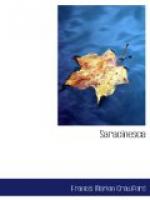“I would like to hear what you think of Don Giovanni Saracinesca,” said Gouache; “and then I would like to hear what he thinks of you.”
“I can tell you both,” answered Del Fence. “I think of him that he is a thorough aristocrat, full of prejudices and money, unwilling to sacrifice his convictions to his wealth or his wealth to his convictions, intelligent in regard to his own interests and blind to those of others, imbued with a thousand and one curious feudal notions, and overcome with a sense of his own importance.”
“And what does he think of you?” asked Anastase, working busily.
“Oh, it is very simple,” returned Del Ferice, with a laugh. “He thinks I am a great scoundrel.”
“Really! How strange! I should not have said that.”
“What? That Del Fence is a scoundrel?” asked Donna Tullia, laughing.
“No; I should not have said it,” repeated Anastase, thoughtfully. “I should say that our friend Del Ferice is a man of the most profound philanthropic convictions, nobly devoting his life to the pursuit of liberty, fraternity, and equality.”
“Do you really think so?” asked Donna Tullia, with a half-comic glance at Ugo, who looked uncommonly grave.
“Madame,” returned Gouache, “I never permit myself to think otherwise of any of my friends.”
“Upon my word,” remarked Del Fence, “I am delighted at the compliment, my dear fellow; but I must infer that your judgment of your friends is singularly limited.”
“Perhaps,” answered Gouache. “But the number of my friends is not large, and I myself am very enthusiastic. I look forward to the day when ‘liberty, equality, and fraternity’ shall be inscribed in letters of flame, in the most expensive Bengal lights if you please, over the porte cochere of every palace in Rome, not to mention the churches. I look forward to that day, but I have not the slightest expectation of ever seeing it. Moreover, if it ever comes, I will pack up my palette and brushes and go somewhere else by the nearest route.”
“Good heavens, Gouache!” exclaimed Donna Tullia; “how can you talk like that? It is really dreadfully irreverent to jest about our most sacred convictions, or to say that we desire to see those words written over the doors of our churches!”
“I am not jesting. I worship Victor Hugo. I love to dream of the universal republic—it has immense artistic attractions—the fierce yelling crowd, the savage faces, the red caps, the terrible maenad women urging the brawny ruffians on to shed more blood, the lurid light of burning churches, the pale and trembling victims dragged beneath the poised knife,—ah, it is superb, it has stupendous artistic capabilities! But for myself—bah! I am a good Catholic—I wish nobody any harm, for life is very gay after all.”
At this remarkable exposition of Anastase Gouache’s views in regard to the utility of revolutions, Del Ferice laughed loudly; but Anastase remained perfectly grave, for he was perfectly sincere. Del Ferice, to whom the daily whispered talk of revolution in Donna Tullia’s circle was mere child’s play, was utterly indifferent, and suffered himself to be amused by the young artist’s vagaries. But Donna Tullia, who longed to see herself the centre of a real plot, thought that she was being laughed, at, and pouted her red lips and frowned her displeasure.




